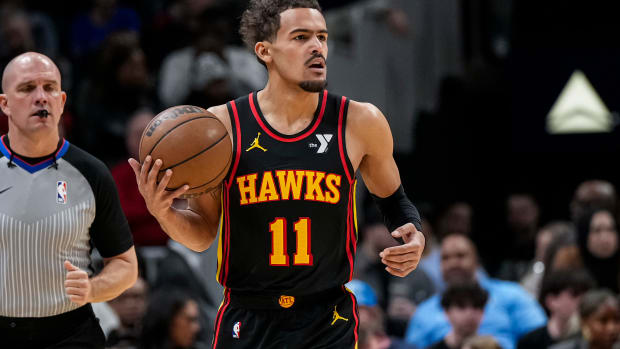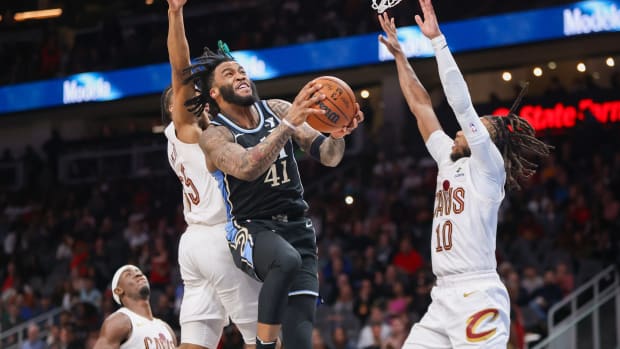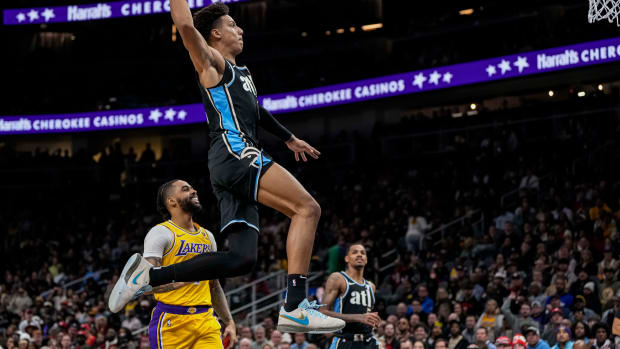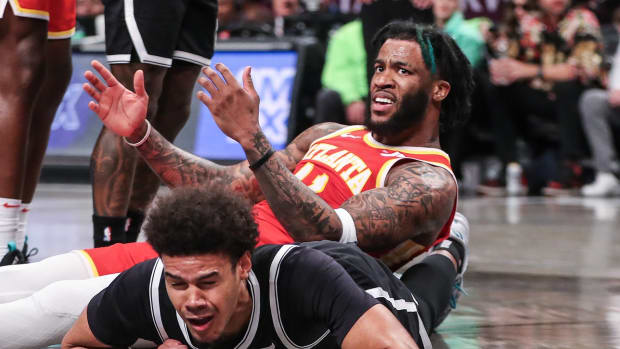Three-Point Play: Embiid Dominates As 76ers Top Hawks In Philadelphia
The Hawks suffered their first loss since the All-Star break Monday night, falling 129-112 to the 76ers in Philadelphia. Despite the lopsided outcome and another slow start, Atlanta put itself in position to win against a team that has lost just twice on its home floor all season. The Sixers (36-22), who have struggled to find night-to-night consistency all year, were without Ben Simmons -- who will miss extended time with a back injury -- but leaned instead on Joel Embiid and created enough of a cushion in the first and fourth quarters to weather the Hawks’ flurry in the middle of the game.
After falling into a massive hole early and trailing by 17 points after the first period, the Hawks (17-42) climbed back to take a one-point lead entering the fourth after a Trae Young 3-pointer beat the third-quarter buzzer. Atlanta made a few key adjustments, including simply ramping up their effort level, and outscored the Sixers 40-22 in the third quarter.
“I thought our guys were brilliant in that third quarter to really compete, take the lead, after the way we started the first half,” Lloyd Pierce said. “Shots weren’t falling tonight but I thought our defense really turned up, especially during that third quarter.”
That lead, however, lasted only 12 seconds, and while the Hawks would tie the game twice more over the final 12 minutes, they slowly slipped out of striking distance once Embiid decided he’d seen enough. The big man finished with a career-high 49 points on 17-of-24 shooting, with 14 rebounds, three assists, and three steals to boot, capping off his masterpiece with a putback slam and a pull-up triple to drive the point home. Once the dust settled, the Sixers had dialed in 1.28 points per possession and 78 percent shooting at the rim (whoo boy) -- led mostly by their franchise centerpiece.
The Hawks, meanwhile, managed just 1.08 points per trip and shot a wretched 19 percent from beyond the arc. With both teams taking care of the ball and consistently getting to the foul line, Philadelphia’s shooting advantage late -- led by Embiid’s efficiency -- made all the difference. “We struggled to score when we needed to most,” Pierce said. “We’d been pretty efficient moving the basketball, getting downhill, and putting pressure on them offensively. And in that fourth quarter they dropped into deep center field in all the the pick-and-rolls and we ended up shooting a lot of floaters, and it was more of a settle game.”
Monday was a rare occasion on which Trae Young was definitively outshined, and while his 28 points and 10 assists helped keep Atlanta in the game, he couldn’t match Embiid’s all-around dominance. John Collins and De’Andre Hunter each had their respective bursts, and finished with 43 points between them. While the Hawks were preoccupied with Embiid, Tobias Harris slipped in through the back door and quietly picked up 25 points for Philly.
Atlanta will return home for a four-game homestand against the Magic, Nets, Blazers, and Grizzlies over the next week. It won’t play another road game until March 6 in Washington D.C. For the time being, here are three takeaways from Monday night’s tug-of-war.
Joel Embiid dictated the terms of the game
Simmons’ absence makes the Sixers less dynamic, but it also rids them of any question about who the offense should run through. Absent its most dynamic playmaker and versatile defender, Philadelphia played almost entirely through Embiid while he was on the floor, and he delivered with a dominant showing on both ends. He controlled the game with his size at the rim -- both protecting it and putting the ball through it -- and seemed to take great delight in terrorizing any Hawk who dared try and slow him. Most often, it took two defenders for Embiid to even register a threat, and still he powered through them on occasion.
The pressure he put on the middle of Atlanta’s defense created breakdowns on the edges of it. Save for the first possession of the game, Atlanta’s doubles were largely ineffective -- even if they accomplished the basic step of making Embiid give the ball up. Even when the Hawks successfully forced the ball out of his hands with double-teams, the other three defenders allowed Philadelphia to swing the ball into open 3s and layups. Their rotations and closeouts weren’t sharp along the perimeter, and Harris and Furkan Korkmaz readily stepped into free points. “We were blitzing in the first half and I thought our rotations were poor,” Pierce said. “I thought the blitz was great because we got it out of its hands. Our rotations were poor behind it.”
Though Embiid only finished with three assists, his ability to get rid of the ball quickly led to swing passes and sequences that resulted in open shots. He isn’t Nikola Jokic, but Embiid has made incremental progress passing out of the post as double-teams become increasingly necessary. He read the game brilliantly on Monday and had the creative freedom to impose his will however he liked.
“He’s just a smarter player,” said Pierce, who coached Embiid as an assistant on Brett Brown’s staff in 2017 and 2018. “He knows how to attack against the double team a little bit better. He’s a load with the duck-ins, he’s using his size and his physicality a lot more, and tonight he was really tough on the offensive glass just cleaning up a lot of missed shots, especially when we were scrambling and rotating.”
These are the kinds of concessions Embiid forces his opponents to make. When he both induces and exploits that compromise, there’s rather little any defense can do to deny him.
Trae Young shot 2-for-11 on 3-pointers
Monday evening was one of Young’s worst 3-point shooting performances of the season, and yet he finished with 28 points and 10 assists on 10-of-22 from the field. He was 8-for-11 from 2-point range and made all six of his free throws, but Philadelphia’s defense clearly prioritized taking away his pull-up shooting and making him drive into Embiid at the rim. Young still expertly dropped floaters over the Sixers’ big men and set up his teammates for layups, but the goal of taking away his shooting space clearly worked. Young missed nine of his 11 3-pointers and didn’t sink his first triple -- a 29-footer -- until midway through the third quarter. While a few came on open looks, Philly successfully forced and contested difficult attempts.
Even without Simmons in the lineup, the Sixers have a wealth of options to use on Young, which gave him little reprieve from Philly’s relentless perimeter defense. Young is now 7-of-25 from deep against the 76ers, but unlike in the first two games in Atlanta, he wasn’t able to bait their defenders into fouls on Monday night. That increased the payoff of Josh Richardson, Shake Milton, and Matisse Thybulle staying attached to his hip as they fought over ball screens, and those three had clearly made it a point to avoid fouling the shifty point guard.
Despite an off-night from 3, Young still used the threat of his shot to get downhill and create advantages for the Hawks. Every shooter is liable to go cold on a given night, and if he makes four 3s instead of two, a poor mark turns into an average one. But there is a growing sample size that suggests the Sixers are a particularly pesky matchup for Young. This will be worth monitoring when they meet for a fourth time in March.
De’Andre Hunter woke up at halftime
Hunter was not good offensively for the first 24 minutes of Monday’s game. He finished the first half with six points and a pair of turnovers on 2-of-8 from the field; he missed all four of his 3-point attempts, and some weren’t particularly close. When he picked up two early fouls, it felt as though he could be in for another frustrating, anonymous showing against a physically overpowering opponent.
Something clearly changed after halftime. Hunter came out of the break more accurate, more decisive, and more self-assured, attacking the rim at every opportunity and refusing to be overwhelmed by Philadelphia’s size, strength, and quickness on the interior. He rallied to score 16 points on seven shot attempts -- nearly all of which came at the rim. More than his 22 points, it was the force with which Hunter played in the second half that stood out most. He attempted a career-high 10 free throws and several of his seven rebounds came in traffic. His defense was solid all night, even as he struggled offensively in the first half.
The coaching staff has implored Hunter to play with that kind of force all season, and ever since a quiet stretch in January, he has begun to bring increasingly consistent aggression to the floor. “There’s never a flashy play with him,” Pierce said. “He’s just playing around the basket, trying to make plays. He’s trying to make the right play, he’s always in the right spot, he’s a very solid offensive player. We needed that. We missed him the other night but it was good to have him back tonight.”





